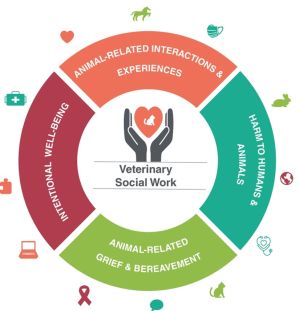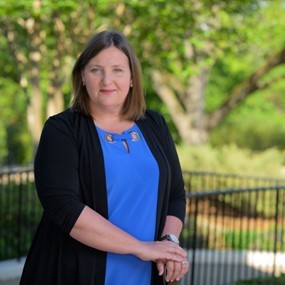What is a Graduate Certificate in Veterinary Social Work?
The Veterinary Social Work certificate prepares social workers to navigate challenging conversations and experiences. Whether exploring financial decisions, navigating the pain of pet loss, finding safety with pets after experiences with violence or natural disaster, or partnering with animals for therapeutic engagement, the Veterinary Social Work focus is an asset for any social work practitioner. This knowledge is beneficial at the micro (direct client engagement), mezzo (program design, implementation and evaluation), and macro (policy and advocacy) levels of practice.

The Auburn University Veterinary Social Work (VSW) Certificate is a Graduate Social Work Certificate designed for Master of Social Work (MSW) students at Auburn University. The certificate is designed to increase the number of graduate level social workers educated in how human-animal interactions impact the human experience.
VSW Certificate students will develop knowledge and skills as they think critically about the human animal bond as it impacts the core content areas of Veterinary Social Work which include:
- Intentional well-being - Animal related professionals experience a great deal of grief, stress, and trauma in their work. Veterinarians are said to experience death at a higher rate than human doctors do simply because the life span of animals is generally shorter. In some animal shelters hundreds of animals are often euthanized each day due to over population. Animal control workers and humane officers, like adult and child protective service workers, must witness neglected and abused animals on a daily basis. All of this can create high levels of compassion fatigue among animal related professionals. Veterinary social workers offer help with the precursors and aftereffects of compassion fatigue.
- Animal related grief and bereavement – Impact of the human-animal bond is felt in the challenging period of time when humans make end-of-life decisions for their animals. Social Workers can provide grief and bereavement assistance in this period of unique loss.
- The link between human and animal violence – A great deal of research has been conducted on the link between human and animal violence. This type of violence often occurs in family violence situations, where animals become victims of perpetrators like their human beings do. Animal cruelty statues vary state to state with many states adopting cross reporting laws where animal welfare professionals must report suspected violence across species.
- Animal-assisted interventions – Human-Animal Interactions (HAI) describes, in broad scope, the way that people’s and animals’ lives co-exist. There are various forms of HAI that have beneficial outcomes for human beings. These forms of HAI are addressed in literature in a variety of terms. This area of focus in Veterinary Social Work will address the differences of definitions, terminology and roles of professional social workers and working animals. It is important to make these distinctions in order to grasp a deeper understanding of human animal interactions.
A primary role of Veterinary Social Work is to address intentional well-being of the veterinary professional.
Source: https://vetsocialwork.tennessee.edu/
Certificate Completion Process
- Complete the Application - Admitted MSW students may submit an application through the Graduate School. This application will include an updated resume and a letter of intent to the MSW Program Director. The letter of intent should be completed in 750 words or less.
- Complete 9 hours of course credit (all credits are MSW courses):
- SOWO 7600 Veterinary Social Work Practice (3)
- SOWO 7040 Social Work in Healthcare (3)
- SOWO 7950 Field Seminar (3)
- In addition to completing the above credit hours, students are expected to:
- Include a Veterinary Social Work Concept in the Advanced Field Placement Learning Plan
- Participate in the Veterinary Social Work oath ceremony
For more information, contact Dr. Julie Wells.
